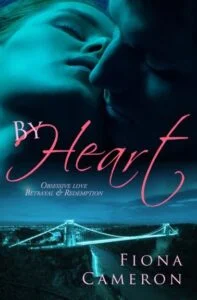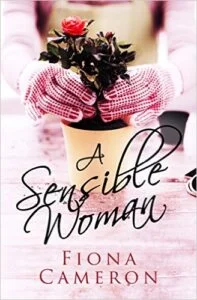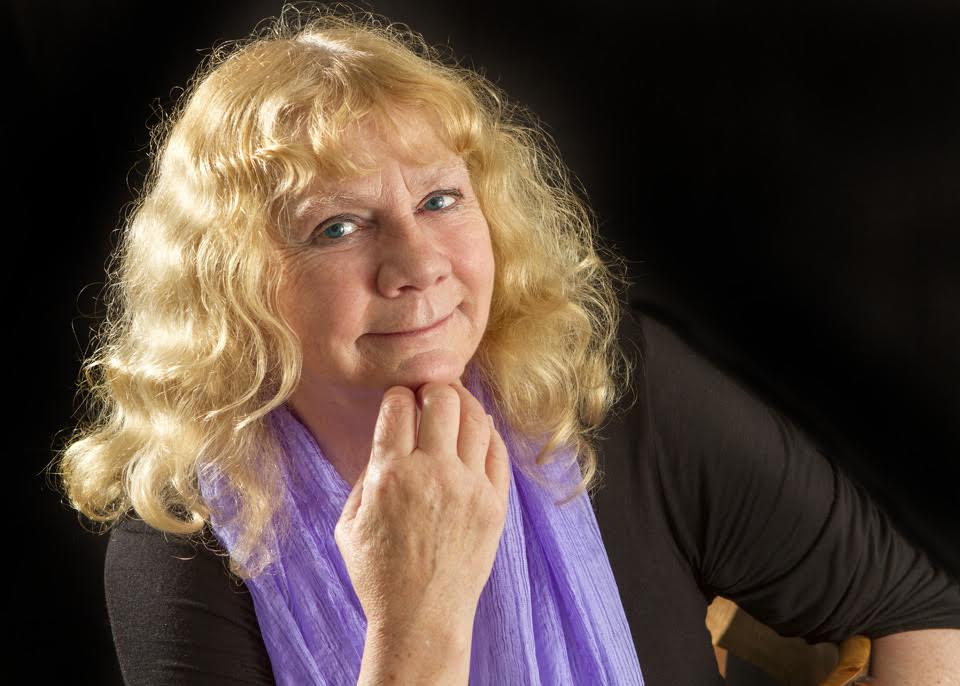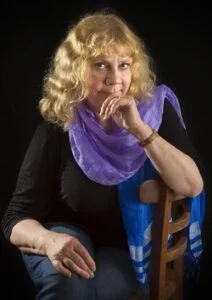Scottish indie author Fiona Cameron
When Scottish novelist Fiona Cameron shared her new philosophy of self-publishing in the ALLi Facebook forum (one of the many benefits of a paid membership of the Alliance of Independent Authors), her post resonated with so many members that we wanted to share it with the wider world on our blog too.
It's time for some real soul-searching.
Although I now have five novels to my name, the whole self-publishing arena is STILL a very steep learning curve for me. I spend not only a lot of time but a lot of money on getting each book out, because I'm paying for professional editing, cover design & formatting, to make sure each is as good as it can be.
I have very few Amazon reviews (although I tend to get some very pleasing direct feedback from readers), and I sell very, very few copies of the ebook versions. I'd say I'd be very lucky if I'm making back 10% of what it's cost me to get the book out, in the first year at least.
Any advertising I do (very little), and using facilities like Netgalley (I'm growing fonder of it by the day, BTW) eat up more than that 10% return.
The Relative Value of Amazon Reviews
 However, I find it comforting, in a perverse way, to look at the Amazon reviews of some of the books which I would rate as my top ten of modern fiction and non-fiction. Take, for example, Cees Nooteboom's Roads to Santiago. A princely total of three Amazon reviews, and here's one of them:
However, I find it comforting, in a perverse way, to look at the Amazon reviews of some of the books which I would rate as my top ten of modern fiction and non-fiction. Take, for example, Cees Nooteboom's Roads to Santiago. A princely total of three Amazon reviews, and here's one of them:
‘Despite all the hype and OTT reviews, I was disappointed with this book, but if you like reviews of churches, religious artefacts, and architecture, then go ahead and enjoy. Frankly, I feel it gives a very limited image of Spain. Having said that, he has a good writing style, but pity it was not more focused on the many aspects of Spain.'
I assume this reviewer is referring to reviews in the print media, by professional reviewers – and yes, maybe they were OTT, because this is (to my mind) one of the finest travel books ever written. The Amazon reviewer quite clearly didn't ‘get' it. Nooteboom's The Foxes Come at Night gets very positive reviews: a whole TWO of them.
And how about Penelope Fitzgerald's Offshore? It has 69 Amazon reviews. Here's one of them:
‘I disliked this book intensely,I finished it because I belong to a book group and wanted to join in the discussion at our meeting. Can't understand how it won the Booker prize.'
Sally Vickers' Instances of the Number Three: 29 reviews, including this: ‘This was our latest book club choice. Utter rubbish!' My 4th book was selected by a book club too, and I know some of them hated it. I'm in great – very great – company.
So would I rather have written a book that garnered more than a thousand Amazon reviews, or would I rather feel I even had my foot on the same ladder as Penelope and Sally? Guess. 😉
It's Not Just About Sales

Fiona Cameron's latest self-published novel
I know I'm lucky, in that I have made a very good living from writing for other people over the past few years (not ghosting, but PR/marketing blurb), and so I can afford to spend on getting my books to the stage I want. I'll keep on writing as long as I'm physically and mentally up to it, and I'll go on spending money on perfecting my books, as long as I can afford to.
I'm ecstatically happy for all the ALLi members who sell thousands of books, and make a living from it. But I believe there's also a community of us for whom that's far from being the case. What we're doing still has value.
One of the greatest benefits of belonging to an organisation like ALLi is that we can share, we can support one another, we can ENCOURAGE one another, and we can believe that there's more to being a successful writer than garnering Amazon reviews!
OVER TO YOU How do you define self-publishing success? We'd love to hear your views.
Why successful #selfpublishing isn't defined by book reviews and sales by Fiona Cameron Share on X





I’m currently on the fifth rewrite of my second Historical Fiction novel. It’s the second part of a seven volume series and it has become very taxing to bring down the word count. I am disappointed in not receiving reviews via Amazon on my first novel, “VALOR WITH HONOR, ADVENT OF A SCOTTISH LEGEND.” My sales have not met expectations, but I have managed to sale over 300 books within the first year. Most sales have been through my own contacts and very few through Amazon or other media sales. I have received several reviews directly from readers… and I’ll admit, all have not been positive. I recently attended a family reunion where a relative of my wife informed me that, after having my novel for a year, he finally began reading it. He commented, ” I hope it becomes more interesting as I read further.” I asked him what it was that he thought to be so boring? Then I discovered how he only read the Introductory and part of chapter one. I was surprised that he thought the Intro. and first chapter was boring. Most others who commented on the book loved the intro. and the opening chapter because this is what captured their interest to the point of causing them to continue reading.
I try not to allow negative remarks bother me but, since this was my first attempt at writing , those type of remarks kind of dig at my heart. However, I attempt to use the negative to improve on my writing of the next book. I have followed the advice of some successful self published authors and gave away over 150 books, and asked, “If you liked the book or even if you did not enjoy it, would you mind giving it a review on Amazon?” So far one review… and it came from my daughter! I have been told that some had sent in their review over the Amazon web site, but the review fail to appear. Oh well, I’ll keep trying for reviews, but whether or not I receive them, I’ll continue to write.
[…] Opinion: Why There’s More to Successful Self-publishing than Amazon Reviews and Book Sales […]
[…] Opinion: Why There’s More to Successful Self-publishing than Amazon Reviews and Book Sales […]
[…] Why There’s More to Successful Self-publishing than Amazon Reviews and Book Sales by Fiona Cameron […]
You can compile your ebooks for free, using Scrivener, Jutoh or Cailbre (the last two are free) + reviews, especially in fiction don’t always convert into sales, IMHO and IME (in my experience).
And just bought your latest book 🙂
The whole Amazon review thing is interesting. I’ve managed to get 3 reviews in papers (Irish Independent, Irish Examiner and Horse & Countryside) to date but yet have only 3 Amazon reviews. Sometimes your target readers just don’t read ebooks that much or don’t think of leaving Amazon reviews.
I like the point you suggested though regarding how self publishing is a slow burn and that’s its main difference to traditional publishing when publishers want the book to do well in its first year or so and then that’s more or less it. By saying that you make back 10% in the first year, it certainly suggests that you go on to make the rest and more in future years. I know I was hoping that the sales of my first book would surge when the second came out and it did and I know now that I’ll get sales of both when the third comes out and so on.
Like you, I invest a lot in the books including revamping website and getting an illustrator to draw some quirky pictures for the book. It’s all worth it when you’ve a product to be proud of.
Well said, Fiona – we’re a diverse community with differing motivations. Agree with David and Jane too, that we need to identify what is important to us as writers. Applaud others who achieve their goals, whatever they may be, and remind ourselves, the moment we sit down at our desks, why we do this. Thanks for your post.
The best thing about being an indie and part of the indie industry sector is that we’re diverse. I applaud our more commercially-minded authors for sharing their methods and encouraging us all to put our business hats on more often, but I also love to hear stories from authors who just want to put the one book that’s inside them between covers or who have such unique brains that their perfect readers are few and far between.
I feel like I’m a semi-commercial author. I happen to like writing in a lightweight, fairly fast-paced style, but I write nineteenth-century historicals that aren’t a “hot” genre. I’m learning to market, but I don’t want to turn my insights into money by publishing courses or podcasting (it took me a year of soul-searching to realize that). I enjoy experimenting and tracking results, but I’m more driven by the challenge of writing than by sales numbers. I couldn’t be a trad author because of the pressure to hit sales figures and conform to a particular genre. So being indie is the perfect spot for me.
[…] Fiona Cameron When Scottish novelist Fiona Cameron shared her new philosophy of self-publishing in the ALLi […]
Fiona–
It’s a matter of pride, isn’t it? Writing what we’re happy to associate our names with. In addition to the excellent points you make, I would add this: as a male writer whose principal “target” audience is women. I was urged to use my initials on my covers, to conceal my gender. Why? Because statistics say 90 percent of both men and women readers confine their reading to books written by authors of their own gender.
When I published my first Brenda Contay suspense novel, I succumbed to this advice–and then I rebelled. Why would I be so coy? If I were writing principally to make money, I might have stuck with the prudent commercial advice I was given. But then I realized that if my primary motive were commercial success,I wouldn’t be developing the kinds of novels I write. So, I changed the cover, and now make use of my name.
Unfortunately, I can’t make the same change to my website address.
Mr. Penny – I absolutely agree! I have been fortunate enough to have had a lucrative and successful lifetime career of being a Federal contract law expert (writing policy and regulation for the U.S. government) – and so, I don’t write my self-published books for money. I write about theological subject matter using stanza-structured rhyming poems (first self-published on Amazon in Dec. 2013) – and self-publishing my first book has been a wonderful experience for me, and for those who know me! Self-published authors write because we have something to say, stories to tell! The fact that Amazon.com itself had told me in 2013 that poetry is the “worst” selling genre of all, out of the millions of books that they sell – it didn’t deter me at all! In fact, I am finishing up an epic, also in rhyme – I got the idea from the great works of theological type poetry (Dante’s Inferno, and Britain’s John Milton, who published Paradise Lost in 1657, I think it was). That’s the kind of book I LOVE to write – and I’m having the best time doing it! However, I was unprepared for all the “marketing” one has to do after self-publishing. Getting a book noticed is the biggest challenge of all – but I have learned from watching major publishing house webinars that the experience is the same for all of the big publishing houses. So, getting a book noticed by the public is difficult for them, as well – despite their full-time marketing resources.
I liked your blogpost, Fiona, and publish my novels in the same way as you – spending a lot of money for an excellent service provider who does even more – SilverWood Books, in case you’re interested, and not getting great bucks back in return.
However, one can’t dismiss the fact that good Amazon reviews help to sell books. And apparently they sit up and take notice if you pass the 20 review mark with mainly 5 & 4 star ones. All my reviews are from the readers’ hearts, though I do give a gentle nudge sometimes for them not to forget they promised they would write a review.
I loathe the supermarket who coined this phrase, but in this case it’s true: every little helps.
Good luck with your sales.
Funny but this article reminds me of how Marylin Monroe had to deal with the bigots of Hollywood when she started her career- “They’ll pay you a million dollars for your kiss but your soul is worthless”.
Thanks for this, Fiona. Sometimes we get lost in the success stories and forget that really, we write because it’s impossible for us not to.
Simply getting my first novel in publishable condition would mean success for me.
Thank you for your honesty Fiona. It is refreshing and very helpful to those who are new to self publishing. I wish you all the best for future sales.